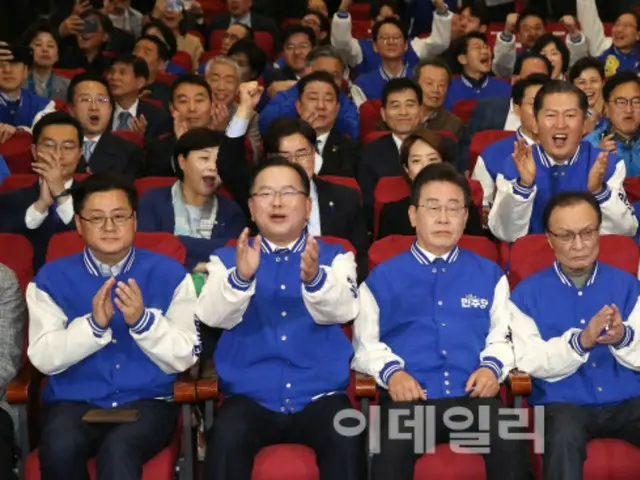However, looking at the actual vote turnout in the local districts, 50.5% of the public voted for both the Democratic Party and 45.1% for the People's Power Party.
According to the National Election Commission, the total number of votes in 254 electoral districts across South Korea was 29,234,129.
Of these, the Democratic Party won 14,758,083 votes, while the People's Power Party won 13,179,769 votes. If the electoral districts were divided simply based on the percentage of votes, the Democratic Party won 128 seats, the People's Power Party won 13,179,769 seats, and the People's Power Party won 13,179,769 seats.
The Democratic Party will win 115 seats. However, the actual number of seats in the local districts is 161 for the Democratic Party and 90 for the People's Power, so the difference between the two parties is 71 seats.
This is because of the "winner-takes-all" single-seat constituency system, in which only the candidate who placed second will win a seat. Any votes cast by the People's Power candidate who placed second will be considered "wasted votes."
In this general election, one in four votes were cast in districts where the ruling party lost.
These were "wasted votes" that chose candidates from the People's Power Party. The People's Power Party lost in 164 local districts across the country, but received 7,326,423 votes here.
On the other hand, the number of people who chose the Democratic Party and ended up with a "wasted vote" was about 100%.
The number of votes cast was 12.5% (3,361,917). The opinions of citizens who cast wasted votes are not reflected in the National Assembly. Every election there are cases where the winner is decided by a difference of several hundred votes.
In Yongin, Democratic Party candidate Pu Seung-chan won by just 851 votes over People Power Party candidate Ko Seok. The vice-winner was the representative of about 80,000 Yongin residents who supported candidate Ko.
It is only natural that the will of the people should be heard at the same time. The same can be said for Lee Jung-wook of the People Power Party in Jinhae, South Gyeongsang Province, whose victory was decided by the smallest vote margin in the country.
Perhaps aware of this, Democratic Party Chairman Lee Jae-myung celebrated the victory at the disbanding ceremony held at the party headquarters in Yeouido, Seoul on the 11th.
He maintained a stern expression throughout the election, despite being the only one in the party. He told the winners, "I cannot be so optimistic about the current situation that I can be happy about the party's victory," and added, "Even after the election, I will continue to maintain a humble and active attitude."
"We must listen to the voices of the powers that be," he said. Kim Boo-gyeom, standing joint election committee chair, also said, "This victory was not won because the Democratic Party was recognized.
"The verdict on the Yoon Seok-yeol administration has been served," he said. Lee, who lost the 20th presidential election by just 0.73% of the vote, also spoke of the frightening nature of public opinion in the glamorous winner-take-all world.
Lee repeatedly appealed during the general election campaign that “disloyal employees have no choice but to be kicked out.” In the end, it comes down to “governance.”
On the 12th, Lee visited the National Cemetery and revealed his intention to hold talks with President Yoon Seok-yeol. Regarding the possibility of holding a top-level meeting with President Yoon, Lee said, "In that case,
"We need to meet face-to-face and talk, and it's unfortunate that we haven't been able to do so until now," he said, adding, "We will meet as soon as possible to talk and discuss."
2024/04/13 07:05 KST
Copyrights(C) Edaily wowkorea.jp 107

